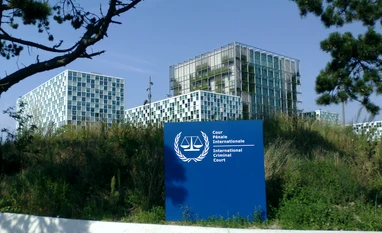What is the International Criminal Court that issued Netanyahu's warrant?
International Criminal Court issued warrants for the Israeli Prime Minister and former Defence Minister Yoav Gallant, accusing them of crimes against humanity related to the 13-month war in Gaza
)
International Criminal Court, ICC | Photo: Wikimedia commons
Listen to This Article
The International Criminal Court (ICC) has issued warrants for Israeli Prime Minister Benjamin Netanyahu and former Defence Minister Yoav Gallant, along with Hamas military leader Mohammed Diab Ibrahim Al-Masri, accusing them of crimes against humanity during the 13-month war in Gaza.
However, on Friday, Hungarian Prime Minister Viktor Orban said that he would defy the issuance of an arrest warrant for Netanyahu and even extended an invitation to his Israeli counterpart. But what is the ICC and what does defiance of its warrant means?
What is the International Criminal Court ?
The International Criminal Court, or ICC, is a permanent judicial institution established in 2002 under the Rome Statute. The Rome Statute was adopted on July 17, 1998. It prosecutes individuals for grave international crimes, including genocide, war crimes, crimes against humanity, and crimes of aggression. It is based in The Hague, Netherlands.
What crimes does the ICC prosecute?
The ICC has jurisdiction over four types of crimes:
Also Read
1. Genocide: Acts aimed at destroying a national, ethnic, racial, or religious group, including killing, causing harm, or imposing conditions to destroy the group.
2. Crimes against humanity: Widespread or systematic attacks on civilians, including murder, rape, enslavement, apartheid, and deportation.
3. War crimes: Grave breaches of the Geneva Conventions, such as targeting civilians, using child soldiers, or attacking hospitals and cultural sites.
4. Crimes of aggression: Armed attacks by one state against another, threatening its sovereignty or independence.
“The Chamber issued warrants of arrest for two individuals, Benjamin Netanyahu and Yoav Gallant, for crimes against humanity and war crimes committed from at least 8 October 2023 until at least 20 May 2024, the day the Prosecution filed the applications for warrants of arrest,” the ICC had said in its official statement.
When does the ICC have jurisdiction?
The ICC can prosecute crimes that occurred after July1, 2002, within member states (States Parties) or involving their nationals or when cases are referred to them by the United Nations Security Council (UNSC) in non-member states that have accepted the court’s jurisdiction.
Which countries are part of the ICC?
The Rome Statute, which established the ICC, has been signed by 139 countries and ratified by 123 countries, making them State Parties to the Statute. Most European nations are signatories and State Parties, including the United Kingdom, France, Germany, Italy, and Hungary. Some African, West Asian and Asian countries have signed and ratified the treaty.
Israel is among the countries to have signed the treaty but not ratified it. This means that at the time of signing Israel showed its support to the establishment of the ICC and its principles. However, they have not ratified it, meaning they are not legally bound by the treaty and do not fall under the ICC’s jurisdiction unless they later choose to ratify it or accept ICC jurisdiction for specific cases.
Is India part of the ICC?
No, India is not part of the ICC. India chose not to sign the Rome Statute during the tenure of Prime Minister Atal Bihari Vajpayee. The Indian delegation, under the leadership of then Minister of State for External Affairs Vasundhara Raje, expressed concerns regarding the Statute’s provisions, particularly those related to the ICC’s jurisdiction over non-international armed conflicts and the exclusion of terrorism from its purview.
Subsequent administrations have maintained this position, including Prime Minister Manmohan Singh in 2013, when the government reiterated India’s stance.
US, Russia, China not part of ICC
Other major nations such as the United States, Russia, China, and Turkey are also not part of the ICC.
The US had initially signed the Rome Statute under President Clinton but did not ratify. It was later renounced under President George W Bush. Similarly, Russia had signed, but later withdrew its intent to ratify.
How is the ICC funded?
Similar to UN contributions, member states fund the ICC based on their wealth. The UK, Japan, Germany, and France are the largest contributors.
Challenges of the ICC
The ICC seeks to hold perpetrators of grave crimes accountable on an international platform, which is necessary, especially in cases where national courts are unable to do so. However, there are many challenges for the ICC to enact its powers. Some of the limitations include, but not limited to, are:
Limited jurisdiction: Non-member states like the US, China, and India are beyond its reach.
Reliance on cooperation: Without its own police force, the ICC depends on member countries for enforcement.
Political resistance: Some nations view the ICC as infringing on sovereignty and may choose to resist its orders.
Impact of Hungarian PM’s denial on the ICC
The ICC relies on the cooperation of its member states to enforce its orders, as it lacks its own enforcement force. Hungary’s refusal to comply with the arrest warrant undermines the court’s credibility and effectiveness. Such non-compliance by a member state can also set a concerning precedent, potentially encouraging other nations to disregard ICC directives. This can weaken the institution’s authority.
More From This Section
Topics : Decoded Explained criminal cases crimes Courts BS Web Reports Israel-Palestine israel Gaza conflict Gaza Hungary
Don't miss the most important news and views of the day. Get them on our Telegram channel
First Published: Nov 22 2024 | 5:48 PM IST

